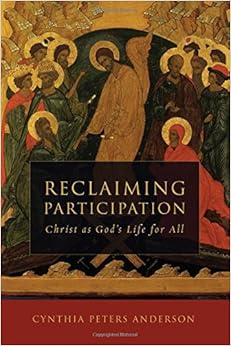Interest in the theological idea that we are united with Christ or participate in Christ has started to catch on in Protestant circles as of late. I don't know if this is rooted in a rediscovery of our Eastern Orthodox roots or if it is linked to a renewed interest in orthodox, relational, Trinitarian theology. Either way, we have had a fair amount of monographs come out on the topic of how exactly we live our lives in Christ and mature in Christ. More specifically, the topic of theosis or deification of the Christian is what this conversation centers around. How much of the divine nature do we actually partake in (2 Pet. 1:3-4) or possess?
Enter Reclaiming Participation: Christ as God's life for All by Cynthia Peters Anderson. Anderson argues that in order to have a firm, orthodox understanding of what it means to participate in Christ we actually need to look back to Cyril of Alexandria and the early church's thinking on our relationship to the divine. Only then can we fully appreciate and safely explore contemporary discussion on what it means to be in Christ.
After a chapter exploring what the early church and Cyril of Alexandria taught concerning theosis, Alexander brings Cyril into dialogue with Barth and Balthasar's more complex thinking on this topic. Using Cyril, the author critiques and helpfully advances the conversation. The solution forward is by looking back to our rich heritage.
The book is nuanced and complex (and heavily footnoted). It would be impossible in a review this length to cover every topic. However, I do want to briefly comment on the issue of sanctification and its relationship with participation in Christ. Alexander does a really great job of showing how our telos is to be like Christ but that has immediate ramifications for now.
Alexander argues that the Protestant argument for imputed righteousness and the Catholic argument for infused graced are not as diametrically opposed as many on both sides believe (Loc. 5358). She asks a series of telling questions like,
"Is it possible that on the basis of Christ's righteousness and saving activity on our behalf, we receive an infusion of grace that makes this action transformative in us as a result of the Holy Spirit's work within us? Can we not be at once accounted righteous as a result of Christ's alien righteousness, but also--as a pure gift of God relying solely on the power of the Holy Spirit=-be made righteous as we are infused by grace and transformed into the people god intends us to be as a result of the life, death and resurrection of Jesus Christ?" (Loc. 5358)
Alexander rightly points out that while the idea of bearing fruit in salvation can lead to the mindset of salvation by works, it does not necessitate it. I agree completely. Works play an important role in showing a declaration that has already taken place in Christ. I know of few Protestant churches that would not affirm that statement.
My largest issue with Alexander's book is that I wish she would have interacted more with the Bible. I recognize that this was largely a work of systematic theology and comparing the thinking of Cyril, Barth and Balthasar. Yet, by the end of the book I didn't really feel as if there were any definitive conclusions made. It wasn't a bad book but it left me with very little to cling to.
Due to the technical nature of this work, it would probably be best read by pastors, seminarians and scholars. It is worth reading and I do think it contributes to the discussion of theosis, especially as it relates to the thinking of Barth and Balthasar. I would recommend this work.
*Thanks to Fortress Press for providing a free ebook copy in exchange for a fair review*

No comments:
Post a Comment